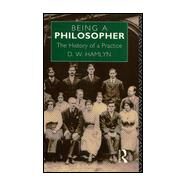Being a Philosopher: The History of a Practice
, by Hamlyn,David W.- ISBN: 9780415029681 | 0415029686
- Cover: Hardcover
- Copyright: 7/21/1992
Histories of philosophy tend either to chart the ideas and arguments of philosophers or to relate philosophers' ideas to their historical context. InBeing a Philosopher, David Hamlyn takes an original approach by charting the history of the practice of philosophy. This entertaining and illuminating account is the first history to answer the question: what do philosophers actually do? David Hamlyn examines the main trends in the practice of philosophy and shows how philosophers have been regarded over time. The Greek philosophical schools provided the first professional philosophers. While philosophy played a significant role in the setting up of the universities in the Middle Ages, it was severely limited by its subservience to theology. This study examines the progressive professionalism of philosophy, the emergence of philosophical journals and societies, and current arrangements for the practice of philosophy in higher education. David Hamlyn considers the greatphilosophers of the seventeenth and eighteenth centuries, exploring the issue of why so few had anything to do with teaching or any other institutional arrangements. Socrates died for his teaching; Aquinas was kidnapped by his brothers on the way to study at university; Spinoza and Liebniz turned down philosophy chairs; Hume was twice refused a philosophy chair; Russell arrived in America only to find his professorship had been withdrawn due to his immorality. The unusual relationship between philosophers and the institution of philosophy makes this book enjoyable and fascinating reading for all present or aspiring philosophers and students of philosophy.







